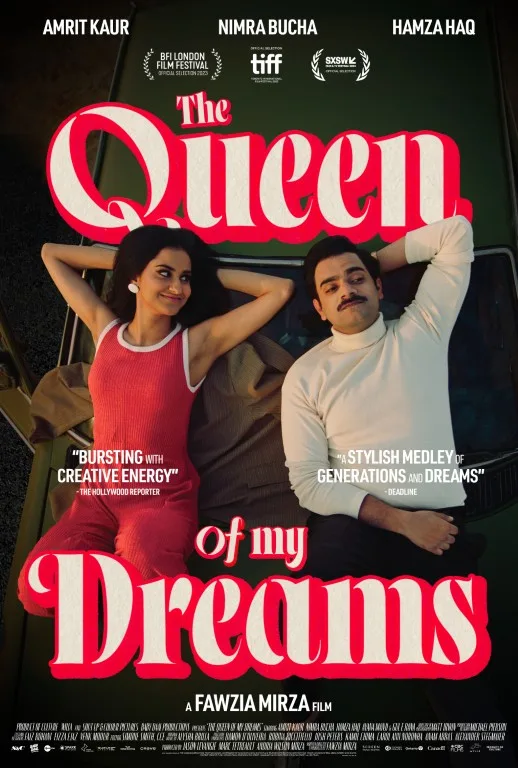Showing up right smack dab in the middle of Pride Month (and also unfortunately while Israel and Iran are currently airstriking each other), “The Queen of My Dreams” is a well-intentioned but tonally all-over-the-place look at how frustrating things can get when you’re a queer Muslim trying to live your best life.
Mainly set in 1999, the movie follows Azra (“The Sex Lives of College Girls” regular Amrit Kaur), an Pakistani Canadian grad student and aspiring actress who travels to her Karachi homeland to mourn the passing of her father (Hamza Haq). Once she’s there, she immediately butts heads with her heavily devout mother Mariam (Nimra Bucha), who wants her to adhere to the usual rites of mourning, which mostly consists of covering herself up in old-school Muslim garb and grieving with the ladies while the men do all the funeral preparations.
It’s a sad, bleak time for everyone involved, a complete 180 from how things were back in the day. The movie also flashes back to Karachi in 1969, when Azra’s mom (also played by Kaur) was a young, free-spirited woman beginning a sweet courtship with the future father of her children. It’s during these scenes where the movie visually snaps with colorful sharpness, a throwback to those Eastman Color-enhanced Bollywood movies starring Sharmila Tagore, Azra’s favorite actress.
“Queen” is an extended version of the three-minute experimental short South Asian Muslim writer-director Fawzia Mizra did back in 2012, where she assumes the role of a Bollywood starlet getting seduced by a swarthy, handsome gent, played by another woman in drag. Mirza goes full semi-autobiographical in this feature version, flashing back to her teenage years growing up in 1970s Nova Scotia with her fam – Ayana Manji plays young Arza in these scenes, while Bucha fully assumes Mariam – and slowly realizes she may be into girls. (For these scenes, the visuals are drab but comfortable, like so many ‘70s films of that time.) Unfortunately, her sexual awakening happens right after her dad gets a heart attack and her mother, once a Tupperware-selling modern woman, prays to Allah and promises to submit to Muslim traditions if he survives.
Like most minority filmmakers who get the chance to tell their story in a feature film (and worry they may never get this opportunity again), Mizra gives us a lot with “Queen.” It’s basically a Bollywood-style romp, a family dramedy, and an indie psychodrama all in one movie. Since Bollywood films are regularly known to genre-bounce within a film, it’s almost like Mirza wanted to see what would happen if you threw some cinema-of-despair tropes in the mix.
Needless to say, the tonal shifts are jarring. One minute, you’re having a good time watching Mariam fall in love and become her own woman. The next minute, you get Azra and Mariam throwing verbal daggers at one another as they prepare for a funeral that’s already flooded with pain and anguish. Some viewers may prefer to stick with the peppier flashback scenes instead of going back to the funeral scenes, which appear to be the least fleshed-out part of the picture.
This obviously makes “Queen” just as dysfunctional as the family that’s in it. Mizra does find a ready-and-willing lead in Kaur, who exudes stylish, carefree cool as the mother and sad-eyed, tomboyish petulance as the daughter. Bucha, who some Westerners may know from her dedicated-mom roles in the MCU show “Ms. Marvel” and that wackadoo coming-of-age actioner “Polite Society,” once again continues her streak of playing strict, stubborn matriarchs who live by the my-way-or-the-highway code.
From the way Mirza tells it, life was more fun and comfortable before the Islamic Revolution messed things up. Since then, archaic Muslim traditions have ruined not only her homeland but her family. It turned her mother against her and virtually made her a pariah among her people. An uneven vision of what beautifully once was and what sadly still is, “The Queen of My Dreams” tells queer Muslims you can go home again. Unfortunately, it’s hard to be yourself once you’re there.




















